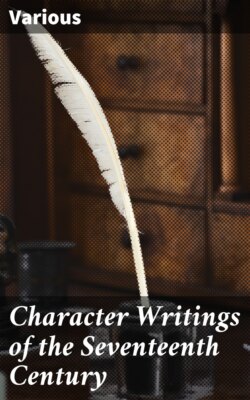Читать книгу Character Writings of the Seventeenth Century - Various - Страница 37
На сайте Литреса книга снята с продажи.
THE TRUE CHARACTER OF A DUNCE.
ОглавлениеTable of Contents
He hath a soul drowned in a lump of flesh, or is a piece of earth that Prometheus put not half his proportion of fire into. A thing that hath neither edge of desire nor feeling of affection in it; the most dangerous creature for confirming an atheist, who would swear his soul were nothing but the bare temperature of his body. He sleeps as he goes, and his thoughts seldom reach an inch further than his eyes. The most part of the faculties of his soul lie fallow, or are like the restive jades that no spur can drive forward towards the pursuit of any worthy designs. One of the most unprofitable of God's creatures, being as he is a thing put clean beside the right use; made fit for the cart and the flail, and by mischance entangled amongst books and papers. A man cannot tell possibly what he is now good for, save to move up and down and fill room, or to serve as animatum instrumentum, for others to work withal in base employments, or to be foil for better wits, or to serve (as they say monsters do) to set out the variety of nature, and ornament of the universe. He is mere nothing of himself, neither eats, nor drinks, nor goes, nor spits, but by imitation, for all which he hath set forms and fashions, which he never varies, but sticks to with the like plodding constancy that a mill-horse follows his trace. But the Muses and the Graces are his hard mistresses; though he daily invocate them, though he sacrifice hecatombs, they still look asquint. You shall note him (besides his dull eye, and lowering head, and a certain clammy benumbed pace) by a fair displayed beard, a night-cap, and a gown, whose very wrinkles proclaim him the true genius of familiarity. But of all others, his discourse and compositions best speak him, both of them are much of one stuff and fashion. He speaks just what his books or last company said unto him, without varying one whit, and very seldom understands himself. You may know by his discourse where he was last; for what he heard or read yesterday, he now dischargeth his memory or note-book of--not his understanding, for it never came there. What he hath he flings abroad at all adventures, without accommodating it to time, place, or persons, or occasions. He commonly loseth himself in his tale, and flutters up and down windless without recovery, and whatsoever next presents itself, his heavy conceit seizeth upon, and goeth along with, however heterogeneal to his matter in hand. His jests are either old fled proverbs, or lean-starved hackney apophthegms, or poor verbal quips, outworn by serving-men, tapsters, and milkmaids, even laid aside by balladers. He assents to all men that bring any shadow of reason, and you may make him when he speaks most dogmatically even with one breath, to aver poor contradictions. His compositions differ only terminorum positione from dreams; nothing but rude heaps of immaterial, incoherent, drossy, rubbishy stuff, promiscuously thrust up together; enough to infuse dulness and barrenness in conceit into him that is so prodigal of his ears as to give the hearing; enough to make a man's memory ache with suffering such dirty stuff cast into it. As unwelcome to any true conceit, as sluttish morsels or wallowish potions to a nice stomach, which whiles he empties himself, it sticks in his teeth, nor can he be delivered without sweat, and sighs, and hems, and coughs enough to shake his grandam's teeth out of her head. He spits, and scratches, and spawls, and turns like sick men from one elbow to another, and deserves as much pity during his torture as men in fits of tertian fevers, or self-lashing penitentiaries. In a word, rip him quite asunder, and examine every shred of him, you shall find of him to be just nothing but the subject of nothing; the object of contempt; yet such as he is you must take him, for there is no hope he should ever become better.
